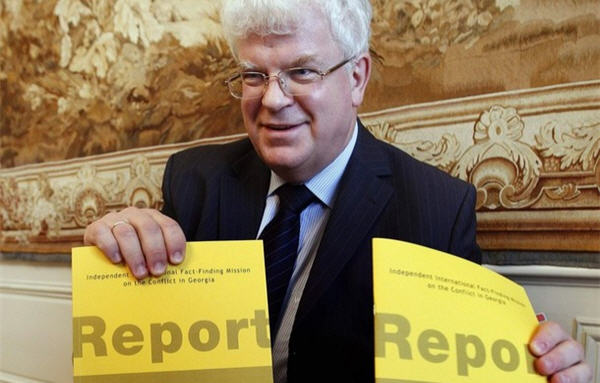EU Georgia Report False Equivalency
 As widely anticipated, an EU report on last year’s Russian invasion of Georgia finds plenty of blame to go around, finding that Tblisi “triggered” the conflict but that Moscow violated international law by its invasion and with numerous atrocities thereafter.
As widely anticipated, an EU report on last year’s Russian invasion of Georgia finds plenty of blame to go around, finding that Tblisi “triggered” the conflict but that Moscow violated international law by its invasion and with numerous atrocities thereafter.
This leads John Cole to quip, “Was the McCain/Palin campaign right about anything?”
As I detail in my New Atlanticist post, “EU: Georgia ‘Triggered’ Russia’s Illegal Invasion,” this is quite wrongheaded. Not because the McCain/Palin “We’re all Georgians now!” posturing was wise — it wasn’t — but because they at least understood the basics of international law in a way the EU panelists do not.
Only the most ardent Georgian nationalists believe that Mikheil Saakashvili was other than a reckless fool in his actions leading up to the Russian invasion. However, once one recognizes — as the EU panelists here explicitly do — that Abkhazia and South Ossetia are part of Georgia, it no longer much matters.
If sovereignty means anything, it means that leaders of a state have license to take actions within the confines of their borders as they see fit, so long as they don’t create adverse spillover effects for their neighbors. Saakashvili’s actions against internal groups conducting illegal activities within the borders of his country, while unwise and perhaps even provocative, are simply no justification for an illegal invasion of its sovereign territory by another member of the United Nations. Period. End of story.
I don’t actually end the story there, of course, so click the link for more.
Photo: Reuters Pictures (cropped).





I clicked through and was confused by the complaint that the U.S., Israel and the Ukraine provided military training and equipment to Georgia that encouraged risk-taking activity.
As I recall, France was a large provider of same, but I don’t see that mentioned. Is that because they helped write the report?
That’s technically true, but complicated by two things:
1. There is spillover, particularly from the South Ossetia assault. South Ossetia is part of the whole Ossetia region, the northern part of which is in Russia, and any serious Georgian effort to militarily re-take the territory was guaranteed to generate refugees to the north (which it did, in the thousands).
2. South Ossetia and Abhkazia had more or less been de facto independent since the early 1990s, when the Georgian leadership mismanaged the autonomous regions into open revolt, then failed to put down the revolts largely through incompetence.
Both of those made a Georgian reclamation highly unwise – and were this somewhere else (like, say, Kosovo in Serbia), the West would be talking about “self-determination”, etc, etc regardless of what the Georgians thought.
James, didn’t the EU report conclude that Georgia’s actions violated international law?
That seems like an important detail. You write:
Fair enough, two wrongs don’t make a right and all that. But I don’t see how that supports your claim of a “false equivalency”. It sounds like both Georgia and Russia are in the wrong here.